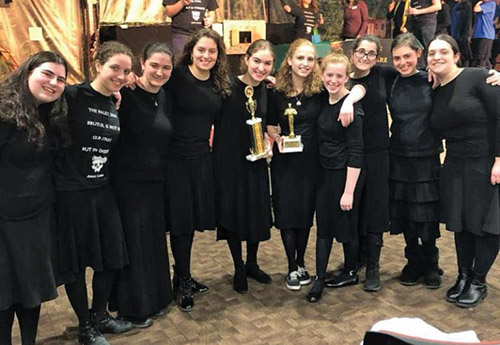



On March 26, seven local Jewish high schools sent teams to participate in a drama competition entitled Envision Shakespeare. The objective was for each team to present Act 1, Scene 2 of “Julius Caesar,” using only four chairs and the participating students’ voices, bodies and imaginations.
Four years ago, theater professionals Rebecca Lopkin and Nancy Edelman came up with the idea of offering high school students the opportunity to look at Shakespeare with their own fresh eyes. The result is Envision Shakespeare, which this year was held in the Frisch School. The participating schools were Bruriah, Frisch, Kushner, Ma’ayanot, SAR, Torah Academy of Bergen County and Westchester Hebrew High School.
I was fortunate to be part of the team representing Bruriah. Our two directors were 11th grade students Shana Erblich and Elisheva Hirsch. The rest of our team consisted of six 10th graders: Bracha Gluck, Temima Hyman, Shalva Poppers, Chava Schapiro, Rivka Shapiro, and me; an 11th grader, Tzipora Zwickler; and 12th grader, Chana Rosenbluth.
I must confess that when I first saw the required script, I couldn’t help wondering how we were going to make this 15-minute scene, consisting only of dialogue and no author-directed action, interesting. The entire scene concerns efforts by Cassius, the debatable villain of the play, to convince Caesar’s friend, Brutus, that the Roman leader is overly ambitious and, in fact, intends to overthrow the republic and allow the public to install him as king.
During the preparation for the competition, I discovered that with clever staging, inspired acting and ingenious character portrayal, the scene morphed from boring to fascinating. As required, we prepared to present the scene in a classroom and then on a stage.
The day of competition began in the morning with a talk by actress Leah Gottfried, an Orthodox-Jewish woman who is one of the leads in the YouTube web series, “Soon by You.” Gottfried described her growth from a theater-obsessed teenager to a professional writer and actress who manages to combine her theatrical career with her religious observance.
For the second event, the participating high school actors were divided into two groups. My group was then subdivided into a few smaller sections. By lots, each of us was assigned a different Shakespearean play. Our task was to present five still tableaux that served as clues so the others could guess which play we were presenting. Students who were in the other group were given a choice of several scenes from various Shakespearean plays and required to turn the lines into song lyrics.
Finally, it was time for the first of the main events: The classroom presentation of the prepared scene from “Julius Caesar.” Some of the teams had been coached by teachers; others, like us from Bruriah, were entirely student-run. Before we went on, our Bruriah directors gave us a pep talk and we all said two perakim of Tehillim.
During the weeks of preparation, I had been convinced that our interpretation was the only one possible, that ours was the one Shakespeare himself would have envisioned. The moment the competition began, I realized how wrong I was. There were so many different ways to interpret the scene, the characters and even the individual lines. It was breathtaking to watch how many different ways there were to present essentially the same words.
After a few minutes of questions-and-answers with Gottfried, during which she graciously offered her own words of advice and encouragement, we were given the judges’ decisions. Only three teams were allowed to advance to the second round. Frisch, Ma’ayanot, and Bruriah had made the cut. We would be presenting the scene on stage. Needless to say, we were overjoyed that all our hard work had paid off. Before the final round, however, a few students from the various schools competed in a separate competition: The presentation of Shakespearean sonnets they had committed to memory.
After a few minutes of last-minute practice time, mincha and, for us at Bruriah, the recitation of two more perakim of Tehillim, we began the on-stage performances. It was once again amazing to see how differently each of the winning schools had decided to depict the scene. From the intricate, interpretative dancing and elaborate staging produced by the girls at Ma’ayanot to the stark, yet equally effective performance by the Frisch students, the possibilities were obviously endless. Bruriah’s interpretation of the scene took a middle ground. Sometimes, they depicted the dialogue between Brutus and Cassius as just a conversation between two men; other times, Cassius’s arguments were illustrated by the entire team acting out his major points.
The tension in the air was thick when the time came to announce the winners. In a sense we were all winners. We had all learned a great deal and participated in a competition from which we had all grown. But there could be only one overall winner, and it was the team from Ma’ayanot. Bruriah brought home two trophies—best director and most creative interpretation—to cram into the Bruriah school trophy case next to the others won by our schoolmates in sports and debate competitions.
I’m sure everyone who participated in this year’s Envision Shakespeare would agree with me that this was a rare privilege. We all grew as actors, performers and lovers of theater, Shakespeare in particular. On behalf of the entire Bruriah team, I can say we all owe a debt of gratitude to Mrs. Lopkin and Mrs. Edelman for giving us this opportunity and making this event possible. We hope to bring Bruriah back for next year’s Envision Shakespeare competition.
By Avigayil L. Rosenbluth












